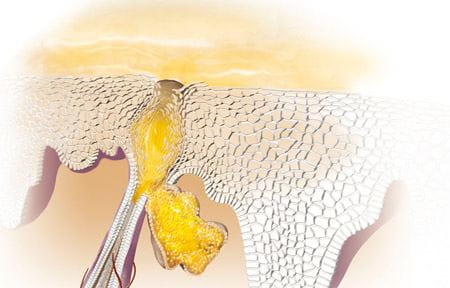Everyone wants smooth and beautiful skin and everyone wants to stay away from acne or pimples.
Here you'll learn more in detail about the 4 key factors that contribute to the formation of acne. Try to understand these factors and prevent your skin to enter the acne stage.
4 Key Factors Behind Formation of Acne
01 Seborrhea
This is the over production of sebum. Physiologically, sebaceous glands secrete an oily substance known as sebum to lubricate hair and skin.
A number of issues such as hormones, climate, certain medications and genetics can trigger sebum production.
A disturbed sebum secretion can also trigger Seborrheic Dermatitis, a common inflammatory skin condition in which flaky, white to yellowish scales form on oily areas, such as the scalp or inside the ear. Read more about Seborrheic Dermatitis.
02 Hyperkeratosis
Hyperkeratosis (or Hyperkeratinization) is a thickening of the outer layer of skin (stratum corneum). Irregular shedding of dead, cornified skin cells (corneocytes) clogs the sebaceous gland’s duct and disturbs or interrupts the release of sebum.
When the skin produces an excess amount of sebum (seborrhea) and dead skin cells remain attached to the skin (hyperkeratosis) the two can build up in the hair follicle and form together as a soft plug. This plug may cause the follicle wall to bulge and produce a closed comedone (whitehead) or, if the plug is close to the surface, an open comedone (blackhead).
03 Microbial colonisation
Bacteria that normally live harmlessly on skin (propionibacteria) build up and can then colonise the plugged follicles, causing papules, pustules, nodules or cysts.
04 Inflammation
The consequence is reddened and inflamed skin. In severe cases of acne, the follicle wall bursts in the late phase of inflammation. Lipids, fatty acids, corneocytes, bacteria and cell fragments are released, causing extended and deep inflammations in the adjacent tissue.





Comments
Post a Comment